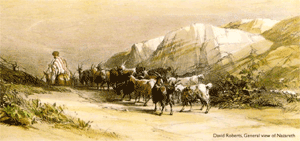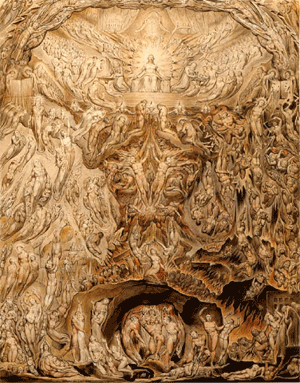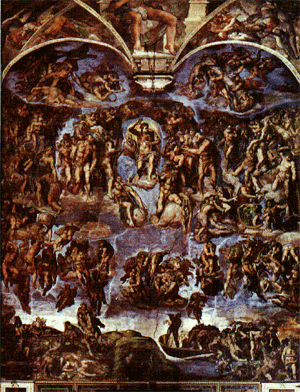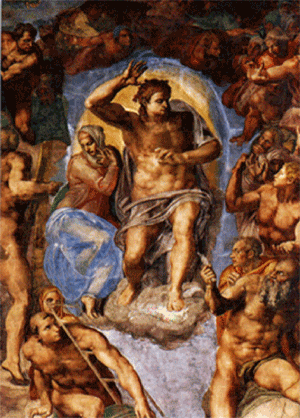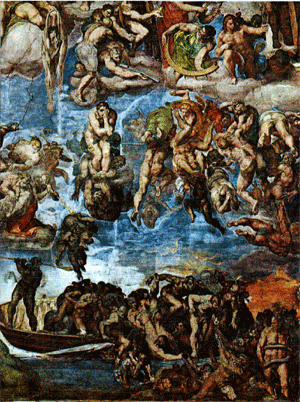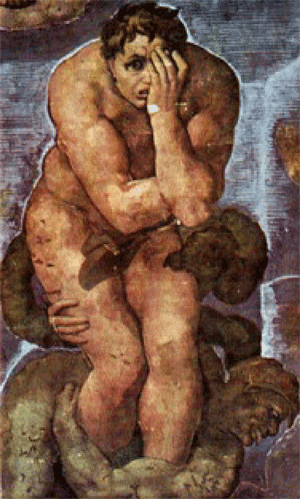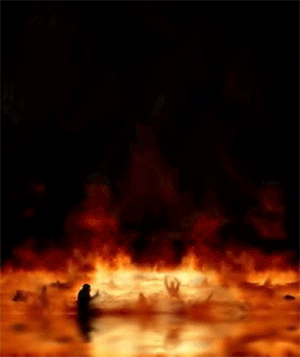
Christmas
Easter
Pentcoest
All Saints
Christ The King
Confirmation
Palm/Passion
Reformation
Stewardship
Books of the Bible
Lenten Series
Christmas Dramas
Videos
Series A - Matthew
Series B - Mark
Series C - Luke
Series D - Other
To contact
Edward F. Markquart
info@sfs.com
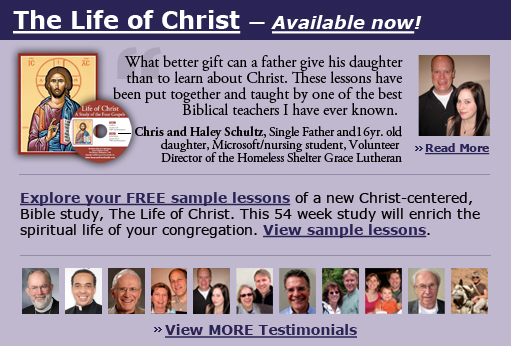
Series A Gospel Analysis: The Sheep and Goats Christ the King (A) Matthew 25:31-46 Pastor Edward F. Markquart The following Bible study is from a larger course entitled, THE LIFE OF CHRIST: A Study in the Four Gospels. This 54 week course for the laity will be available for congregations in 2006. Basic text for the course: SYNOPSIS OF THE FOUR GOSPELS, Kurt Aland, English Edition, P. 240. THE LARGER CONTEXT OF MATTHEW 25:31-46 Matthew 24-25 is sometimes called the Eschatological Discourse. As we recall from earlier lessons, Matthew gathered not only taxes but the teachings and events of Jesus’ life. We remember that Matthew was the organizer, the systematizer, the arranger of the stories about the life of Jesus. We see how Matthew clearly organized his material into sections such as the Sermon on the Mount in chapters 5-7, the miracles in chapters 8-9, teachings on discipleship in chapter 10, parables in chapter 13. Similarly in chapters 24 and 25, Matthew gathers material about the End of the World into this section. According to Aland in his SYNOPSIS OF THE GOSPELS, there are several teaching and events in this segment. Matthew, Mark and Luke all tell the eight stories listed below. Chapter 24: The Eschatological Discourse
Chapter 25: Parables about the Coming which supplement the Eschatological Discourse.
There were two factors that enormously influenced the lives of early Christians:
The early Christians struggled significantly with both of these issues. The End of the World did not come when Jerusalem was destroyed and the Second Coming of Christ did not come as early as they thought. Their personal timetable was wrong for both: for the End and for the Second Coming. THE LARGER CONTEXT OF JUDGMENT WITHIN THE BOOK OF MATTHEW In the Gospel of Matthew, there is a tendency to use the language of violent punishment. Consider phrases uniquely found in Matthew such as "How can you escape being sentenced to hell" or “Destroy those murders and burn their city,” or “Bind him and throw him into outer darkness where will be weeping and gnashing of teeth.” In the Gospel of Matthew, seven of the thirteen references to the word, “hell,” are located in this gospel. Six of the seven references to “weeping and gnashing of teeth” come from Matthew. If you add the words, “hell,” and “weeping and gnashing of teeth,” there are thirteen references (out of twenty in the whole New Testament) to hell in the Gospel of Matthew. Eight of the parables about the last judgment are found only in Matthew’s gospel e.g. *the parables of the weeds and the wheat, *the good and bad fish, *the unforgiving servant, *the gracious employer, *the marriage feast, *the ten virgins, *the talents, *the sheep and goats. (the text for this coming Sunday) The Gospel of Matthew has more of a “hell and damnation” streak in his theology than the other gospel writers of Mark, Luke and John, and this “hell and damnation” streak is found in many of the stories about Jesus that he tells. The New Testament Scriptures consistently teach about the final judgment. It seems that the “fires of hell” is an Aramaic expression that points to the final judgment. For many people, the last judgment is separation from God. For us, hell is separation from God, rather than a firey eternal torture in the lake of fire. For us, the firey eternal torture in a lake of fire is picturesque language that is not to be taken literally, any more than we take literally the “pearly gates” and “streets paved with gold” found in heaven. (Revelation 21:21). “Firey hell” and “pearly gates” are both picturesque language. The concept of fire and hell comes from images of the valley of Gehenna/Hinnom. Wicked King Ahaz burned his children in the valley of Hinnom (2 Chronicles 28:3) The Greek word for hell is “gehenna” and it means the Valley of Hinnom. This valley was and is located southwest of Jerusalem and near to the city. From a human point of view, punishment is appropriate but torture isn’t. From a human point of view, torture is not appropriate in any circumstances Applying this same reasoning to our Eternal God, we may say: eternal punishment is appropriate but eternal torture isn’t. Hell has the connotation of eternal torture. Questions such as these are asked: “Does a loving God exercise judgment?” Yes. “Does a loving God exercise judgment at the Final Judgment?” Yes. “Does a loving God give out eternal torture?” No. http://www.bible.ca/su-heaven-hell-photogallery.htm
“It is impossible for our five senses to detect heaven and hell. How then can God describe for us something that we cannot see, taste, touch, smell or hear? He employs the use of symbols. For example, God says that heaven is a garden and a city. Heaven is not actually a city and a garden. Rather heaven is merely like a city or a garden. There is nothing within our five senses that can actually explain what heaven and hell are like, so God uses a series "word pictures" to convey the next best thing.” In the ATHANASIAN CREED (the Trinitarian creed which is occasionally recited on Trinity Sunday), in the next to the last paragraph of that creed, it says: “Those who have done good will enter eternal life, those who have done evil will enter eternal fire.” The other two creeds (Apostles’ Creed and Nicene Creed) only talk about Jesus returning to "judge the living and the dead." #300. THE LAST JUDGEMENT Matthew 25:31-46 -‘When the Son of Man comes in his glory, and all the angels with him, then he will sit on the throne of his glory. When the Son of man comes!!! This is the issue: the Son of man will be coming in the person of Jesus Christ at the End of history. The Son of man will come with all his angels and be seen throughout all the world. He will sit down on his throne just as God will be on his throne. -All the nations will be gathered before him, All the nations of the world are under the authority and judgment of God. In the New Testament, the word, “nations,” does not refer to “nation states” as we know them today but refers to “ethnic tribes.” The Greek word is “ethnos” from which we get our word, “ethnic.” Ethnic loyalties are still the source of fundamental divisions on this globe called Earth. -And he will separate people one from another as a shepherd separates the sheep from the goats, and he will put the sheep at his right hand and the goats at the left. Once again, we hear another parable of Jesus. Once again, this parable is chosen from the commonness of everyday life. Once again, this is a “separation” parable in which the Son of man will judge and separate the good from the bad. “As in other parables, here they are gathered (compare 13:40; Is 2:4; Rev 16:16) and separated (Mt 13:30, 49), in this instance the way a shepherd would separate sheep from goats (compare Ezek 34:17), to keep the goats warm at night while keeping the sheep in open air as they preferred (Jeremias 1972:206). Sheep cost more than goats (Jeremias 1972:206) and because of their greater utility and value were nearly always more numerous on a farm (N. Lewis 1983:131-32).” Bible Gate The king = the Son of man, Jesus. The sheep = those who hear and do the words of God. -Then the king will say to those at his right hand, “Come, you that are blessed by my Father, inherit the kingdom prepared for you from the foundation of the world; The sheep will be at God’s right hand. -For I was hungry and you gave me food, I was thirsty and you gave me something to drink, I was a stranger and you welcomed me, I was naked and you gave me clothing, I was sick and you took care of me, I was in prison and you visited me.” Circle all the key words e.g. “hungry, thirst, stranger, naked, sick, imprisoned.” These are six groups of people who need Christ’s compassion through his heart, hands and feet. The people with Christ’s heart, hands and feet are those people who follow him. Christian people in all centuries have reached out to the hungry, the thirsty, the strangers, the naked, the sick, the imprisoned. -Then the righteous will answer him, “Lord, when was it that we saw you hungry and gave you food, or thirsty and gave you something to drink? And when was it that we saw you a stranger and welcomed you, or naked and gave you clothing? And when was it that we saw you sick or in prison and visited you?” The righteous are unaware of the identity of those in need. -And the king will answer them, “Truly I tell you, just as you did it to one of the least of these who are members of my family, you did it to me.” Underline the phrase, “one of the least of these who are members of my family.” Focus on that phrase. We believe that all people on earth are the children of God who are in need of God’s care and compassion. All people on earth are the members of the king’s family. Some Biblical scholars will interpret the “least of these” as the people of Christ’s family who are the church, the other faithful followers of Jesus. Works of charitable love are to be extended primarily to the members of Christ’s family. And who are the members of Christ’s family? Some Biblical scholars will answer, “the members of the church.” Since the concept of “church” was developed later than the life of Christ, it seems that the members of Christ’s family were the hungry, thirsty, strangers, naked, sick and imprisoned rather than members of the church. -Then he will say to those at his left hand, “You that are accursed, depart from me into the eternal fire prepared for the devil and his angels; Matthew has been clear about this eternal fire and damnation earlier in his gospel. The Gospel of Matthew and the Book of Revelation both emphasize hell as a place of everlasting fire and torment. (Also see Lesson 9, THE SERMON ON THE MOUNT (2), for a previous discussion about hell.) It would be easy to become diverted into a discussion about hell and miss the essential emphasis of the parable. -For I was hungry and you gave me no food, I was thirsty and you gave me nothing to drink, I was a stranger and you did not welcome me, naked and you did not give me clothing, sick and in prison and you did not visit me.” Matthew, in his gospel, has been very clear: Whoever hears the words of Jesus and does them is righteous. This was the problem of the Pharisees: they knew the right words and religious words but did not do the love of Jesus that he was asking them to do. As others would say, they “talked the talk but did not walk the walk.” -Then they also will answer, “Lord, when was it that we saw you hungry or thirsty or a stranger or naked or sick or in prison, and did not take care of you?” The people who were compared to goats ask the blinded question: When did we see you hungry, thirsty, alone, naked, sick or imprisoned? -Then he will answer them, “Truly I tell you, just as you did not do it to one of the least of these, you did not do it to me.” Underline the phrase, “when you did not do it to the least of these, you did not do it for me.” This phrase does not include the words, “who are members of my family.” It is simply, “the least of these.” Historically, Christians have always been motivated to be involved with the hungry, the thirst, the stranger, the sick, the naked, the imprisoned, regardless if such people were members of Christ’s church or not. One only recalls the parable of the Good Samaritan who was generous to a “victim” who was not of his own religion. -And these will go away into eternal punishment, but the righteous into eternal life.’ The Son of man is the great judge and the great divider. The sheep go into eternal life; the goats go into eternal damnation. Bible Gateway. Please read sermons which are based on this text: GOING INCOGNITO, I DON’T WANT TO BE A GOAT, and OUR FINAL DAY IN COURT. http://www.jhom.com/topics/goats/land.htm DAVID ROBERTS, The Sheep and the Goats
WILLIAM BLAKE http://www.biblia.com/heaven/judg-blake.htm
MICHAELANGELO http://www.christusrex.org/www1/sistine/40-Last.jpg
THE LAST JUDGMENT THE JUDGE MICHAELANGELO http://landru.i-link-2.net/shnyves/christ.Judge2.jpeg
THE DAMNED MICHAELANGELO http://landru.i-link-2.net/shnyves/christ.Judge2.jpeg
DETAIL OF THE DAMNED; PURE ISOLATION AND REGRET
DUNCAN LONG http://www.apocalipsis.org/rev-20.htm THE LAKE OF FIRE
PATRICIA MARVENKO SMITH http://www.revelationillustrated.com/shop/image32.asp THE LAKE OF FIRE |
